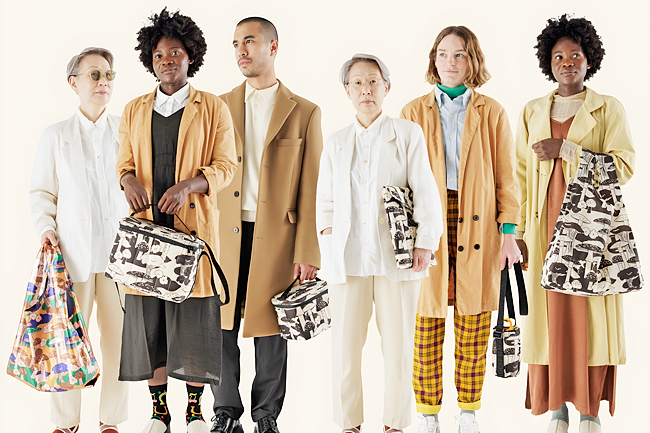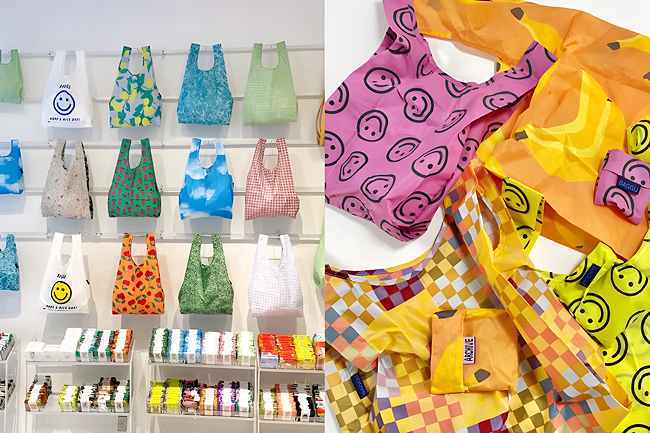CNA/NEW YORK TIMES – Madi McCool discovered a stylish reusable cloth mask while driving through downtown Philadelphia during the summer of 2020. The baby blue, orange, and white mask, adorned with a vibrant daisy pattern, immediately caught her attention.
Through some online investigation, McCool identified the mask as a product of Baggu, a brand renowned for its reusable bags. Intrigued, she purchased a set of three masks and soon found herself expanding her Baggu collection with bags of various designs. McCool now estimates owning around 100 Baggu items.
The collection is “giving me so much serotonin”, said McCool, a grants and communications manager.
Today Baggu is enjoying something of a boom, especially among Gen Z and courtesy of TikTok, which is teeming with self-described ‘Baggu girlies’, bound together by their appreciation for the brand. Search ‘Baggu’, and the hundreds of TikToks posts have collected over 130 million views.
Its ubiquity is not only online: Walk around a farmers market in any major city and you might lose count of how many Baggu bags you see. On nice days in public parks, Baggu’s prints proliferate on blankets, coolers, towels and even tents, instantly recognisable even without a flashy logo.


“Baggu started with one product and three people: me, my mum and my childhood best friend,” Baggu’s founder and Chief Executive Officer Emily Sugihara, 40, wrote in an e-mail. “After 15 years of slow and steady growth, we are a much bigger team now, but still smaller than you might imagine.”
Sugihara, who lives in Santa Cruz, California, said she was “always an entrepreneurial kid”. While studying economics at the University of Michigan, she and a roommate ran “a successful tiny institution” selling screen-printed T-shirts over the Internet.
She went on to study fashion design at Parsons School of Design in New York City, then briefly worked as an assistant designer at J Crew before going freelance. Together with her mother, Joan Hall Sugihara, and her friend Ellen Vanderlaan, the trio released the signature Baggu bag in 2007 after noticing a market need for high-quality reusable bags that were affordable and attractive. Their timing, she said, was lucky.
“There’s been many waves of people being conscious about environmentalism,” she said, adding that 2007 “was another moment of a new generation of people kind of waking up to the fact that we’re, as a society, making some ridiculous choices”.
Initially, Sugihara said, the team looked into manufacturing the bags in the San Diego area, where she grew up, but the quotes she received priced one bag at USD40, “which made it inaccessible for most people”. To keep the low price point they wanted, local factories advised her that the bags would have to be produced in China, so, she said, Baggu worked with a manufacturing agent with a code of conduct and auditors to ensure that their products were being made ethically. Baggu eventually shifted production to a “family-owned factory group” in China that it has worked with for more than 10 years.
The year they launched, the fledgling brand had a course-altering stroke of good luck when it got a one-page spread in the August 2007 issue of Teen Vogue and an influx of orders.
The company’s first customers were teenage girls, who connected to the brand’s accessible price point (USD8 at the time), the ability to choose the colours that spoke to them and, perhaps most important, its eco-conscious ethos.
The teen girls who formed the backbone of Baggu’s first customer base may be all grown up, but Gen Z has taken their place. Now, instead of a splashy Teen Vogue spread, there’s TikTok, where enthusiasts’ posts serve as user-generated marketing for the brand. It’s there that many are discovering Baggu for the first time.
TikTok videos of the “what’s in my Baggu” variety are wildly popular, fetching up to 2.7 million views, as fans pull out keys, wallets, hand sanitiser and even six Jimmy John’s subs. And often, there will be more Baggu accessories inside: sunglasses cases, tablet sleeves, organisational pouches and even more reusable bags, neatly folded and ready to be deployed.






